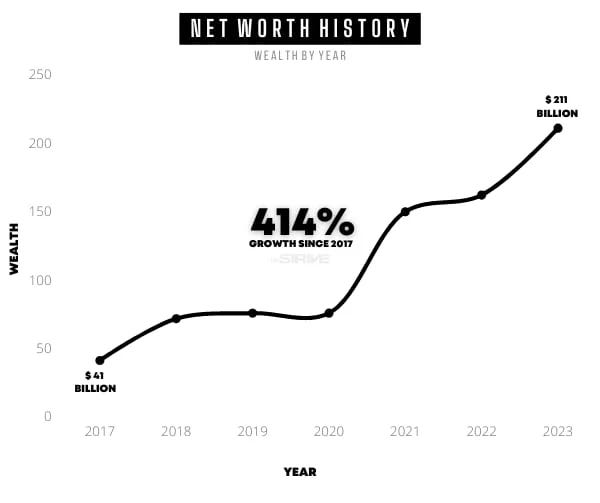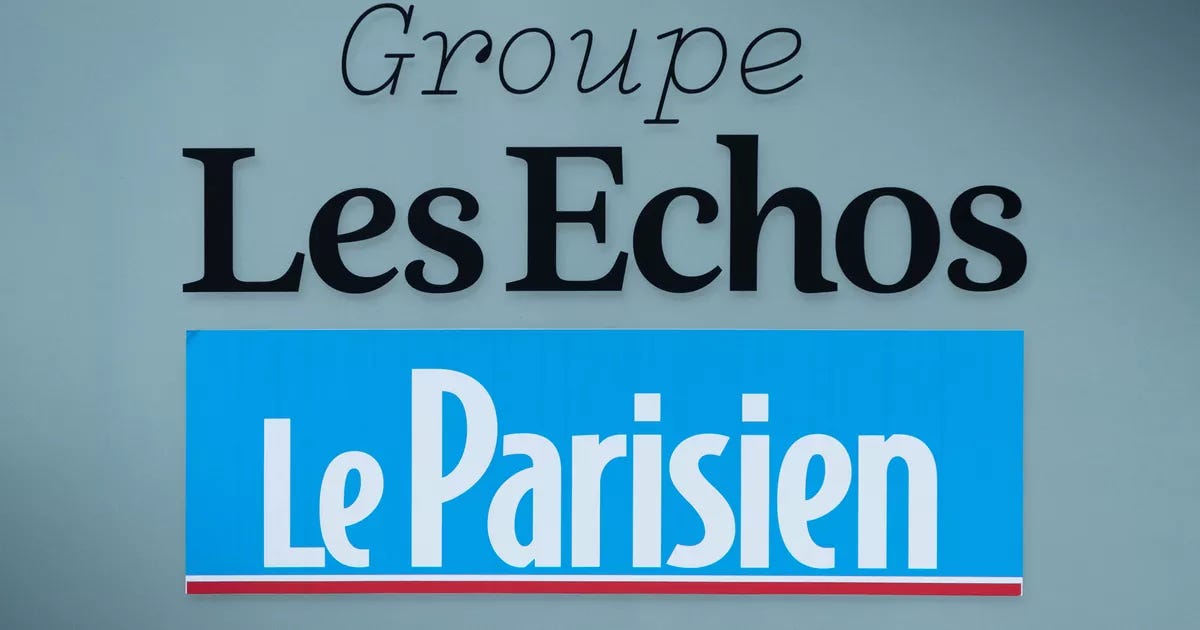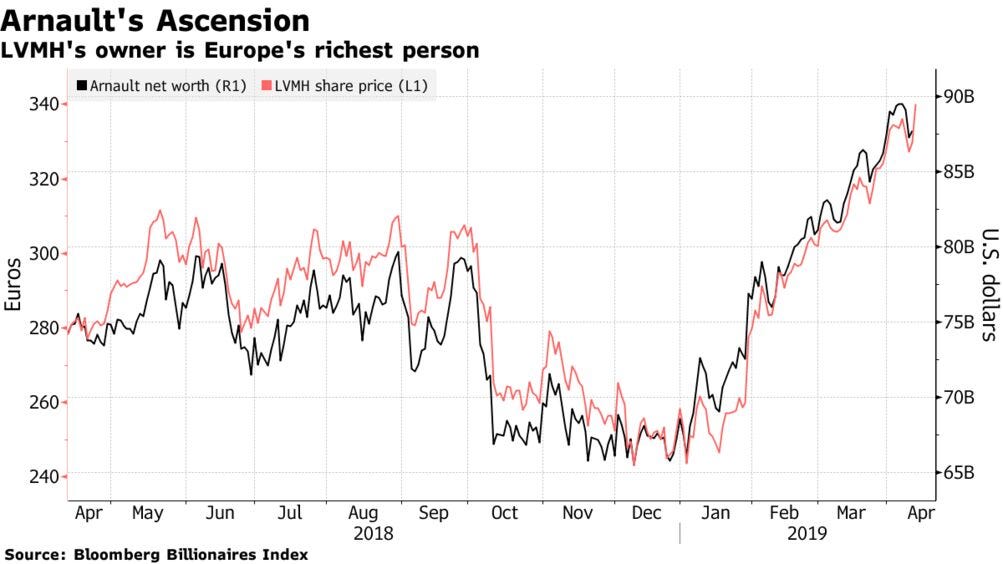The Bernard Arnault Empire of Wealth: A Look into its Origins and Growth
Exploring the Success and Business Savvy of Bernard Arnault, the Genius Behind the LVMH Empire of Wealth
Want to listen instead? Check out the audio version of this article.
Summary:
Bernard Arnault: The Man Behind the Empire of Wealth
From Humble Beginnings: How Bernard Arnault Built His Fortune
The Dior Deal: How Bernard Arnault Transformed the Luxury Goods Industry
The Luxury Portfolio: Bernard Arnault's Strategy for Acquiring and Managing High-End Brands
Beyond Luxury Goods: Bernard Arnault's Diversification into Real Estate, Media, and Hospitality
The Dark Side of the Empire: Examining Controversies Surrounding Bernard Arnault's Business Practices
The Arnault Effect: Analyzing the Influence of Bernard Arnault on the Fashion and Luxury Goods Industry
The Lessons of Bernard Arnault: Reflections on an Extraordinary Career in Business
Bernard Arnault: The Man Behind the Empire of Wealth
Bernard Arnault is one of the wealthiest individuals on the planet, with a net worth of 239.1 billion USD as of 2023. But his success did not happen overnight. Arnault's story is one of determination, hard work, and a keen sense of business acumen. He is the man behind the LVMH Moët Hennessy Louis Vuitton conglomerate, a luxury goods empire that includes brands like Louis Vuitton, Dior, Fendi, and Bulgari. Arnault's rise to the top of the fashion and luxury goods industry has been nothing short of remarkable, and his influence on the world of business has been profound. In this article, we will take a closer look at the origins and growth of the Bernard Arnault empire of wealth, exploring the key milestones in his career and the strategies he has used to build one of the most successful and iconic businesses in the world.
From: The STRIVE
From Humble Beginnings: How Bernard Arnault Built His Fortune
Bernard Arnault's early life and career were marked by a drive to succeed and a willingness to take risks. Born in 1949 in Roubaix, France, Arnault grew up in a family of industrialists, with a father who owned a civil engineering company. After attending college at the École Polytechnique in Paris, Arnault briefly worked for his father's company before striking out on his own. In 1971, at the age of 22, Arnault founded his own business, which specialized in real estate development. Over the next decade, he built a small fortune by acquiring and renovating properties in France, eventually expanding his business to include luxury holiday homes in the French Alps. Arnault's early success in real estate laid the groundwork for his future ventures in the fashion and luxury goods industry, as he learned the importance of identifying high-end properties and catering to a discerning clientele. By the early 1980s, Arnault's net worth had grown significantly, setting the stage for his acquisition of Christian Dior in 1985 and the start of his ascent to the pinnacle of the fashion world.
From: Business Today
The Dior Deal: How Bernard Arnault Transformed the Luxury Goods Industry
The acquisition of Christian Dior in 1985 was a defining moment in Bernard Arnault's career, and it would ultimately transform the luxury goods industry. At the time, Dior was struggling financially, and its reputation had suffered in the wake of the death of its founder, Christian Dior, in 1957. But Arnault recognized the potential of the brand and saw an opportunity to turn it around. With the help of a group of investors, Arnault purchased a majority stake in Dior, and he immediately set about revitalizing the brand. He hired a young designer named John Galliano, who would go on to become one of the most influential figures in fashion, and he invested heavily in marketing and advertising to promote the brand's products. The strategy paid off, and Dior experienced a resurgence in popularity, becoming one of the most coveted luxury brands in the world. Arnault used the success of Dior as a launching pad for his wider ambitions in the fashion and luxury goods industry, acquiring other iconic brands like Louis Vuitton, Fendi, and Bulgari, and cementing his status as a dominant force in the world of high-end fashion.
From: Dior
The Luxury Portfolio: Bernard Arnault's Strategy for Acquiring and Managing High-End Brands
Bernard Arnault's strategy for building a portfolio of high-end brands began with his acquisition of Christian Dior in 1985. Since then, he has expanded his luxury goods empire to include some of the world's most recognizable brands, such as Louis Vuitton, Fendi, and Bulgari. Through his company LVMH, Arnault holds a 47.5% stake in the luxury goods conglomerate, which had a market value of over $320 billion as of April 2021. Arnault's approach to managing his portfolio involves maintaining the exclusivity and desirability of his brands, often by limiting their availability and controlling their distribution. He has also shown a willingness to invest in new brands and emerging markets, such as his recent acquisition of the American jeweler Tiffany & Co. for $16.2 billion in 2019. Arnault's success in the luxury goods industry has been reflected in his personal wealth, with his net worth reaching a record-breaking $239.1 billion in 2023, making him the world's richest person.
From: SmartWeek
Arnault's investment in tech startups through his family office, Groupe Arnault, has also played a role in his overall business strategy. Since the 1990s, Groupe Arnault has backed a number of successful tech companies, including Netflix, Spotify, and Airbnb. In 2017, the family office rebranded as Agache and began investing in startups through venture capital firm Aglaé Ventures. Aglaé Ventures invests in a variety of tech companies, with a particular focus on marketplaces, SaaS, content platforms, and digital native brands. As of December 2022, Aglaé Ventures had taken part in 65 rounds, with a total investment value of $3.4 billion. While Arnault's main focus remains on the luxury goods industry, his investment in tech startups reflects his broader philosophy of seeking out opportunities for growth and innovation in new markets.
Beyond Luxury Goods: Bernard Arnault's Diversification into Real Estate, Media, and Hospitality
While Bernard Arnault is most well-known for his leadership in the luxury goods industry, he has also expanded his business interests beyond this sector. Arnault has made significant investments in real estate, media, and hospitality. In terms of real estate, LVMH owns several high-end properties around the world, including the historic Cheval Blanc hotel in the French Alps and the Bulgari Resort in Dubai. In addition to these properties, Arnault has also invested in luxury apartment buildings in Paris and London.
Arnault has also made significant investments in media, including his acquisition of French newspaper Les Echos in 2007. He has also taken an ownership stake in the Le Parisien newspaper and in the French radio station Radio Classique. Through these investments, Arnault has been able to expand his influence beyond the world of luxury goods and into the broader media landscape.
From: Figaro
Finally, Arnault has also made forays into the hospitality industry. In 2018, LVMH acquired the luxury hotel chain Belmond, which includes properties such as the Hotel Caruso in Italy and the Belmond Royal Scotsman train. Arnault has expressed his belief in the power of experiential luxury, and his investments in high-end real estate and hospitality reflect this philosophy.
Overall, Arnault's approach to business has been characterized by a focus on quality and long-term growth. Rather than chasing short-term gains, Arnault has been willing to invest heavily in building his portfolio of luxury brands and in expanding his interests into other sectors. This strategy has paid off, with LVMH's market share in the luxury goods industry continuing to grow. As of 2022, LVMH's market capitalization was over €300 billion, making it one of the most valuable companies in the world.
The Dark Side of the Empire: Examining Controversies Surrounding Bernard Arnault's Business Practices
While Bernard Arnault has achieved immense success with his business empire, his practices have not been without controversy. In 2018, Arnault was ordered to pay 1 billion euros in back taxes by French authorities, who accused him of hiding assets in tax havens. Additionally, LVMH has faced allegations of worker exploitation and unsafe working conditions, particularly in its leather goods factories in Italy. The company has also been criticized for its environmental impact, including the use of unsustainable materials and the destruction of rainforests for leather production. Despite these controversies, Arnault and LVMH continue to be major players in the luxury goods industry, and the company has taken steps in recent years to improve its environmental and social responsibility practices.
From: International Business Times
The Arnault Effect: Analyzing the Influence of Bernard Arnault on the Fashion and Luxury Goods Industry
Bernard Arnault's impact on the fashion and luxury goods industry has been significant. Through his acquisitions of high-end brands and his strategic management of the LVMH conglomerate, he has transformed the industry and set new standards for luxury and quality. He has also influenced broader economic and social trends, such as the rise of luxury tourism and the increasing importance of the Chinese market for luxury goods. Arnault is widely regarded as a visionary leader, and his business philosophy, which emphasizes creativity, innovation, and excellence, has been emulated by many others in the industry.
“Luxury goods are the only area in which it is possible to make luxury margines”
- Bernard Arnault, A-Z Quotes
The Lessons of Bernard Arnault: Reflections on an Extraordinary Career in Business
Bernard Arnault's remarkable career in business is one of the most compelling stories in modern business history. From his humble beginnings to his current position as one of the world's richest men, Arnault has achieved unparalleled success through his vision, hard work, and strategic business decisions. His leadership of LVMH and his strategic acquisitions in the luxury goods industry have transformed the sector and set the standard for others to follow. Despite controversies and criticism, Arnault's influence on the fashion and luxury goods industry and his contributions to the broader economic and social landscape cannot be ignored. His legacy is one of innovation, creativity, and entrepreneurial spirit. The lessons of Bernard Arnault's career are many, but perhaps the most important is that success in business requires a clear vision, unwavering determination, and a willingness to take risks. Bernard Arnault's life is a testament to the power of these principles, and his remarkable story will continue to inspire generations of entrepreneurs and business leaders to come.
From: Blomberg.com
What lessons do you think can be learned from Bernard Arnault's extraordinary career in business? Share your thoughts in the comments below.
📰👀💰 Don't miss out on valuable daily information about economics and finance! Subscribe to our free newsletter now and stay informed with our brief 2 to 5 minute reads. 😃👍 Don't forget to like this post by clicking the ❤️ under the title of the article so that these Infos can get recommended to more people.
Datas From: Forbes & LVMH & Bloomberg & Financial Times & CNBC
Disclaimer: Please note that I am not a financial advisor and the information provided is my personal opinion, and should not be taken as professional financial advice.











